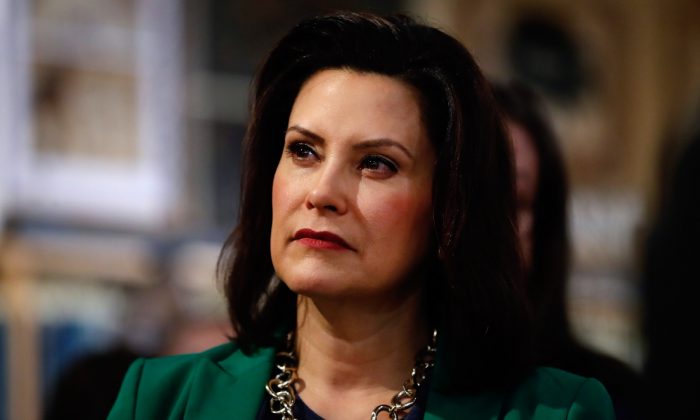Black Firefighter Spent His Life Savings to Open a Bar. Then Minneapolis Looters Burned It Down
The Justice Department has expressed support for businesses that are challenging Michigan Governor Gretchen Whitmer’s pandemic measures, arguing that many of the orders could violate the constitution.
The department filed a statement of interest on Friday in a lawsuit filed by a number of businesses who are alleging Whitmer’s executive orders might be violating the Commerce Clause and the Equal Protection Clause of the U.S. Constitution. The suit was brought by several businesses including a real estate brokerage, a lawn and property maintenance company, an automotive glass exporter, an engine oil and auto parts distributor, a small jewelry store, a dental office, and an association of car washes.
Whitmer’s executive orders contain “arbitrary and irrational limits” that are discriminating against some businesses by treating them differently to other comparable businesses, the DOJ argued in its brief.
“In response to the COVID-19 pandemic, the Governor of Michigan has, over the past two months, issued over 100 executive orders that impose sweeping limitations on nearly all aspects of life for citizens of Michigan, significantly impairing in some instances their ability to maintain their economic livelihoods,” the department said in a statement.
The department also said the orders also raise serious questions on whether the supposed benefit of imposing restrictions on these businesses outweigh the harms to interstate commerce.
“As the President and many States have recognized, the onerous restrictions on civil liberty that Americans have tolerated to slow the spread of COVID-19 cannot continue forever, and the Constitution will not allow them to do so,” the DOJ wrote in its brief (pdf).
Whitmer defended her orders in response to the statement of interest, saying that her decisions were based on “science” and “medical experts” and were made to “keep our hospital system from collapsing and protect front line health workers who are looking out for the people of Michigan.”
“All of us know the importance of getting people back to work and the economy moving again. The state has already loosened restrictions on construction, manufacturing, real estate, and retail, with more expected in the coming days. But the worst thing we can do is open up in a way that causes a second wave of infections and death, puts health care workers at risk, and wipes out all the progress we’ve made,” she said in a statement.
She added that she has “absolute confidence” in the legal authority she had exercised in her attempt to protect Michigan residents.
Whitmer on May 22 extended the state’s stay-at-home order through June 12 while the state begins slowly reopen. The extension keeps certain places of public accommodation such as theaters, gyms, barbershops and hair salons, sporting venues, and casinos closed until at least June 12.
The governor had also begun easing certain restrictions in the state such as allowing gatherings of up to 10 people with social distancing, and opening of retail businesses and auto dealerships with restrictions on the number of people inside at a time and by appointment.
Matthew Schneider, U.S. attorney for the Eastern District of Michigan, said in a statement that he has “no doubt” about the governor’s food intentions but argues that her orders “arbitrarily discriminate by allowing some businesses to operate while similar businesses must close or limit their operations.”
He gave the example that under the orders it would be permissible to buy a jacket at a hardware store but a crime to buy the identical jacket at a clothing store without making an appointment.
“That’s arbitrary. As important as it is that we stay safe during these challenging times, it is also important to remember that we do not abandon our freedoms and our dedication to the rule of law in times of emergency,” Schneider said.
This comes on the same day the DOJ filed statements of interest in two other cases where the lockdown measures appear to be applied in a discriminatory manner. The department argued that Maine’s order requiring out-of-state residents to self-quarantine prior to entering campgrounds, a requirement that does not apply to state residents, is discriminatory and violates constitutional rights.
Meanwhile, the DOJ argued that Colorado’s Governor and the Colorado Department of Public Health and Environment’s orders restricting religious services in a place of worship were significantly more restrictive than the orders placed on indoor service at restaurants. The state announced this week that it would permit up to 50 people to gather inside a restaurant as long as they follow social distancing and cleaning protocols while under the state’s health department’s guidance, religious gatherings are only permitted “if physical distancing is observed and the gatherings are of 10 or fewer people in each room.”
“That discriminatory treatment triggers strict scrutiny review under the Supreme Court’s precedents, and it is the State’s burden to demonstrate that it has compelling reasons to treat Plaintiffs’ proposed gatherings differently than similar secular gatherings, and that it has pursued its objectives through the least restrictive means,” the department said in their brief in that case (pdf).
“Colorado has offered no good reason for not trusting congregants who promise to use care in worship the same way it trusts diners inside a restaurant, or accountants, realtors or lawyers to do the same,” Assistant Attorney General Eric Dreiband for the Civil Rights Division said in a statement.
The statement of claim was filed as part of efforts to ensure that state and local measures do not run afoul of constitutional rights and civil liberties of individual citizens.
Attorney General William Barr directed federal prosecutors on April 27 to keep an eye out for lockdown measures aimed at controlling the spread of the CCP virus that may be infringing the constitution.
Focus News: Justice Department Backs Businesses Challenging Michigan’s Pandemic Restrictions
Black Firefighter Spent His Life Savings to Open a Bar. Then Minneapolis Looters Burned It Down
